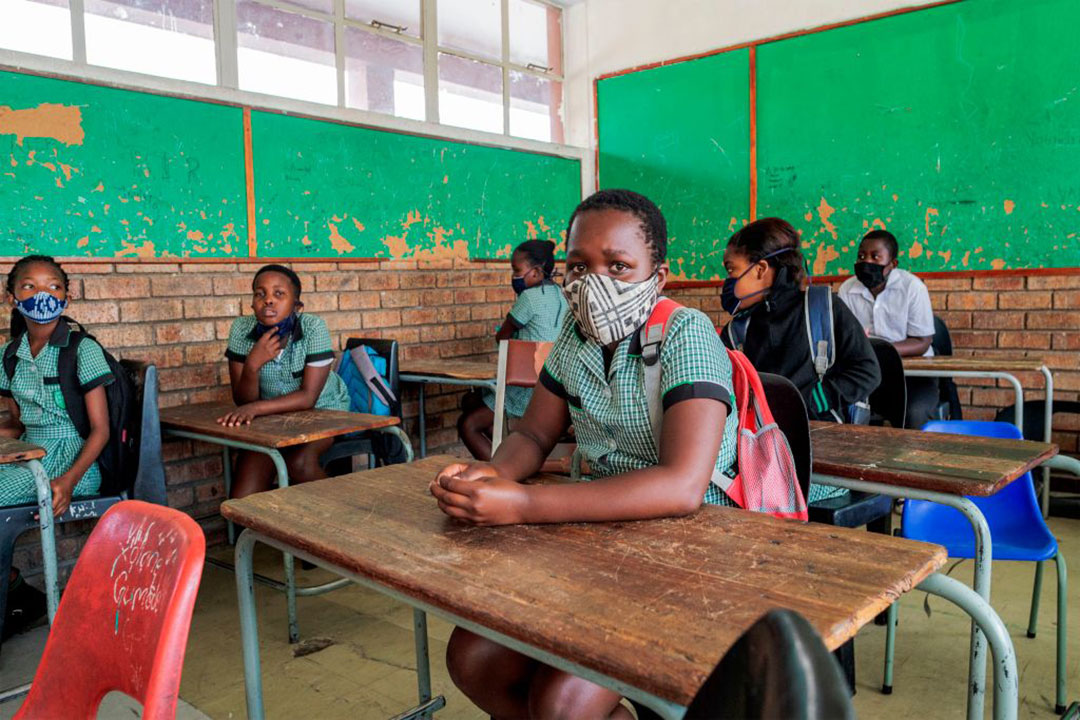Reduced COVID-19 Risk for Children Lets Nations Reopen Schools
ADF STAFF
Although COVID-19 has spared no group, preteen children remain among the least affected by the respiratory disease, a factor that has South Africa rethinking its approach to in-person schooling.
UNICEF estimates that 40% of children in East and Southern Africa are out of school due to the delta variant that has been identified in 36 African countries.
Research by South Africa’s National Institute for Communicable Diseases (NICD) suggests that those school closings might have been unnecessary to manage COVID-19 infections, especially among young children. South Africa’s experience and current strategy holds lessons for other African nations, according to NICD epidemiologist Tendesayi Kufa-Chakezha.
“Children are better off in school than out of school, particularly in settings where access to electronic devices and data for online schooling is limited,” Kufa-Chakezha told ADF. Children who spent the past year learning at home fell behind and sometimes became victims of exploitation and abuse, she added.
“Classes can be conducted outside where there is better ventilation or on a rotational basis so that there are fewer children in class at any one time, and masks and sanitizers provided when communities cannot provide them.”
The NICD defines children as people 19 years old or younger. They make up 36.6% of South Africa’s population, but just 4.2% of COVID-19 hospital admissions and less than 1% of deaths.
“Among children, the likelihood of infection, disease or death generally increases with age,” Kufa-Chakezha wrote recently in an article for The Conversation website. She and her co-authors acknowledged that public health officials initially were worried about the impact of COVID-19 on children because their immature respiratory systems easily fall victim to other respiratory diseases.
“It was a risk worth taking,” Kufa-Chakezha told ADF. “I also think it took too long to reopen schools when evidence became available that schools aren’t major drivers of transmission.”
As it turned out, those same immature respiratory systems have largely protected preteen children from COVID-19 because they lack large numbers of the cells the disease attacks. Those who are infected are less likely to develop symptoms or transmit the disease to others, according to Kufa-Chakezha. However, children who contract COVID-19 do risk developing a rare problem with blood clots.
Teenagers, on the other hand, are as susceptible to COVID-19 as adults and need to take the same precautions, such as masks and social distancing.
The arrival of the delta variant has increased the infection rates among people younger than 19 from 9% of all cases in earlier waves to 14.6% in the latest reports. Half of childhood cases are among people 15 to 19.
Last year, South Africa implemented a shift system that reduced class sizes by having students move between learning in class and learning from home. The country went back to traditional classes this year.
The NICD reports that the shift system was particularly damaging to primary school students, who learned only about one-quarter to one-half of what they would have in person.
The government recently loosened its 28-day restrictions imposed to curb the spread of the delta variant. That included reopening schools, which returned to session between July 27 and August 3. The government also opened vaccinations to people ages 18 to 34.
Kufa-Chakezha and her co-authors say one key to keeping South Africa’s students in school is to vaccinate the adults around them — from school staff to parents. That approach could develop a herd immunity for schools, interrupting the potential spread of the virus within them, the authors wrote.
As she prepared to reopen schools in late July, Minister of Basic Education Matsie Angelina Motshekga announced that 89% of the system’s 582,000 workers had been vaccinated. Others have requested vaccination, she said. Nearly 1,700 education workers had died of COVID-19.
Motshekga said the past year has been hard on South Africa’s children. The country’s National Income Dynamics Study estimates than 750,000 of the country’s 13 million school-age citizens dropped out of school during the pandemic shutdown.
As she announced the reopening of in-person classes with COVID-19 precautions, Motshekga said it is time to reverse the damage.
“Every study that has been conducted shows that a generational catastrophe is unfolding in front of our eyes daily,” Motshekga said. “Something had to be done, and still needs to be done, to arrest the academic losses.”


Comments are closed.